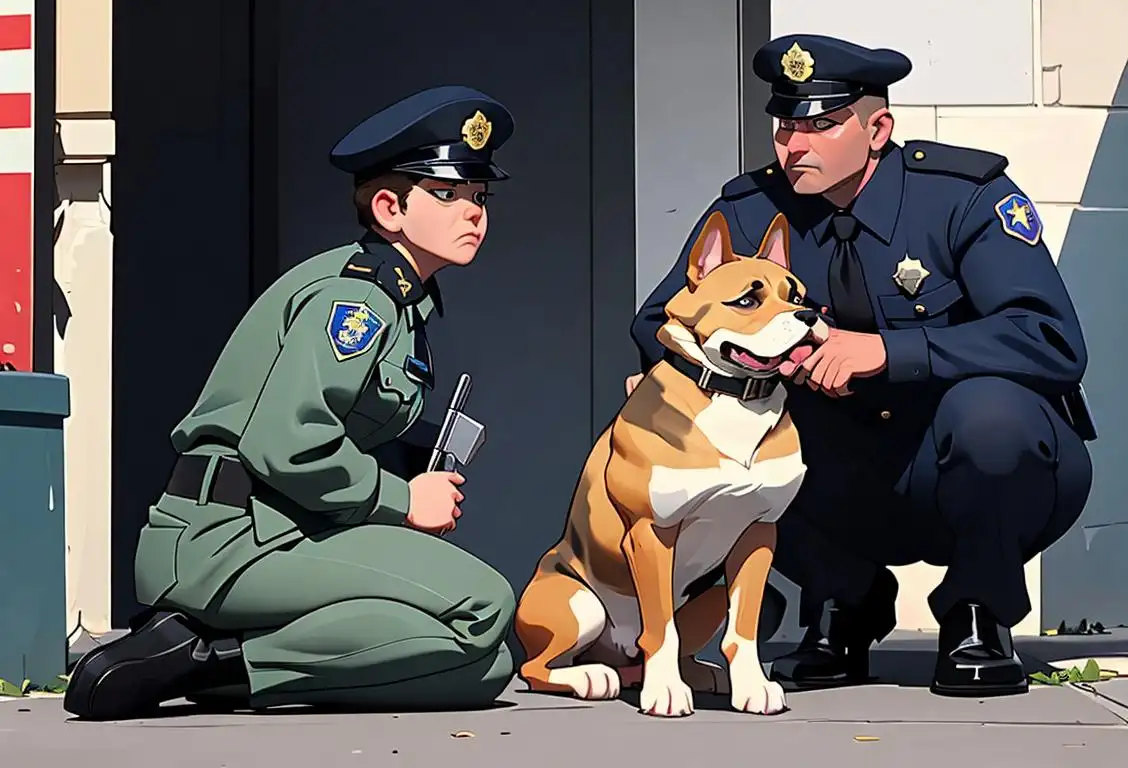National Crime Dog Day

Hey there, crime-solving enthusiasts! Get ready to celebrate National Crime Dog Day, the paw-fect occasion to honor our four-legged heroes. This day is dedicated to those brave and loyal canines who assist law enforcement in their crime-solving endeavors. So, let's unleash the details and learn more about this exciting national day!
When is Crime Dog Day?
It's national crime dog day on the 26th August.
Unleashing the Origins of National Crime Dog Day
Just like a detective cracking a case, let's dive into the history of National Crime Dog Day. While this pawsome day is not officially recognized on any national calendar, it has gained popularity among dog lovers and crime aficionados alike.
These incredible crime-fighting canines have been around for decades, sniffing out clues and helping to solve crimes. The day serves as a reminder to appreciate the invaluable contributions these furry heroes make to society.
Celebrating Our Crime-Solving Companions
On National Crime Dog Day, it's time to honor and celebrate these amazing creatures. Here are a few ways you can join in the festivities:
- Organize a meet-and-greet with local K9 units and their handlers. Let them showcase their skills and share heartwarming stories.
- Donate to organizations that train and support police and search-and-rescue dogs.
- Spread the word on social media using the hashtag #NationalCrimeDogDay. Share photos and stories of crime-fighting canines in action.
Fun Fact: Not all Crime Dogs are German Shepherds
Did you know that German Shepherds are commonly associated with police and military work? While they are one of the most popular breeds for crime-solving roles, other breeds like Bloodhounds, Belgian Malinois, and even Labrador Retrievers also play an important part in solving crimes. These loyal and intelligent creatures use their keen senses to sniff out evidence and track down suspects.
History behind the term 'Crime Dog'
1980
Creation of the crime dog character
In 1980, a new animated character was introduced to the public - McGruff the Crime Dog. McGruff was created by the Ad Council and the National Crime Prevention Council as a way to educate children and adults about crime prevention and safety. The character was designed to be friendly and approachable, wearing a trench coat and a detective hat.
1980
The birth of 'crime dog'
In 1980, Crime Stoppers International introduced a new mascot named 'McGruff the Crime Dog.' Created by advertising executive Jack Keil, McGruff was a cartoon bloodhound dressed in a trench coat and fedora. This lovable character was designed to help raise awareness about crime prevention and instill a sense of community vigilance.
1983
Introducing McGruff the Crime Dog
In 1983, the Ad Council and the United States Department of Justice teamed up to create a memorable character to raise awareness about crime prevention among children. This marked the birth of McGruff the Crime Dog, a large, trench coat-wearing cartoon bloodhound. McGruff was designed to be a friendly and approachable character who could educate children about the importance of staying safe and reporting crime.
1980
The Birth of McGruff
In 1980, the Ad Council, in partnership with the National Crime Prevention Council, created a campaign to raise awareness about crime prevention. They introduced a lovable cartoon character named McGruff the Crime Dog, who became the mascot for the campaign. McGruff quickly gained popularity and became an icon for crime prevention in the United States.
1983
The Creation of 'McGruff the Crime Dog'
In 1983, the Ad Council and the United States Department of Justice collaborated to introduce 'McGruff the Crime Dog' as a mascot to raise awareness about crime prevention. McGruff was created to reach out to children and help educate them about personal safety and crime prevention measures. With his trench coat, hat, and the catchphrase 'Take a Bite out of Crime,' McGruff quickly became a beloved and recognizable figure in the United States.
1980
Introduction of McGruff the Crime Dog
In 1980, the National Crime Prevention Council (NCPC) introduced a new crime-fighting character named McGruff the Crime Dog. He was created to raise awareness about crime prevention and provide educational resources for children and adults. McGruff quickly became an iconic figure in the United States and made his first appearance in a series of public service announcements.
1980
Creation of McGruff the Crime Dog
In 1980, the ad council and the National Crime Prevention Council came together to develop a campaign against crime. As a result, McGruff the Crime Dog was created. McGruff is a cartoon bloodhound who wears a trench coat, a hat, and speaks out against crime, encouraging citizens to take action in their communities.
1980
Introduction of McGruff the Crime Dog
In the year 1980, the Advertising Council and the National Crime Prevention Council introduced a new animated character named McGruff the Crime Dog. McGruff was created to raise awareness about crime prevention and educate children and adults about safety measures. With his trench coat and hat, McGruff became an iconic symbol of crime prevention efforts.
1980
The birth of McGruff
In 1980, the term 'crime dog' came to be associated with the introduction of a popular mascot named McGruff the Crime Dog. Created by the Ad Council and the National Crime Prevention Council, McGruff was a cartoon bloodhound who was designed to raise awareness about crime prevention among children. McGruff quickly became a beloved icon, with his trench coat, hat, and friendly demeanor capturing the attention of both kids and adults alike.
1983
Launch of National Crime Prevention Month
Three years after the creation of McGruff, in 1983, the National Crime Prevention Council launched National Crime Prevention Month. The aim of this month-long campaign was to raise awareness about crime prevention and encourage individuals, communities, and law enforcement agencies to work together to create safer neighborhoods.
1982
The First Public Service Announcement
In 1982, the first public service announcement featuring McGruff was aired. The PSA emphasized the importance of teaching children about crime prevention and urging them to report any suspicious activities to the police. This marked the beginning of McGruff's influence in increasing public awareness and involvement in crime prevention efforts.
1982
McGruff's Catchphrase: 'Take a Bite Out of Crime'
Two years after McGruff's introduction, the famous catchphrase 'Take a Bite Out of Crime' was coined. This slogan became synonymous with McGruff and his mission to encourage individuals to play an active role in preventing crime. The catchphrase resonated with the public, emphasizing that everyone can make a difference by taking simple steps to deter crime.
1983
McGruff takes the stage
Three years after its creation, in 1983, McGruff the Crime Dog made his first television appearance in a series of public service announcements (PSAs). These televised PSAs featured McGruff teaching children and adults about various safety measures, such as preventing burglary, drug abuse, and bullying. The catchy slogan 'Take a bite out of crime' quickly became associated with McGruff and his mission to promote crime prevention.
1982
McGruff's Nationwide Advertising Campaign
By 1982, McGruff garnered significant attention with his catchphrase, 'Take a Bite Out of Crime.' The slogan, along with McGruff's relatable and friendly character, helped in promoting crime prevention programs across the United States. McGruff's distinctive appearance and memorable tagline became embedded in popular culture, making him a household name.
1982
Debut of the first national TV ad
In 1982, McGruff the Crime Dog made his first appearance in a national television ad campaign. The ad featured McGruff teaching children about the importance of locking their doors and windows to prevent burglaries. The catchy slogan 'Take a Bite Out of Crime' was also introduced, becoming a memorable phrase associated with the character.
1984
The First Public Service Announcement
The following year, in 1984, the first McGruff the Crime Dog public service announcement (PSA) was launched on television. These PSAs featured McGruff interacting with children, teaching them about various safety measures, and promoting the importance of being responsible citizens. The catchy slogan, 'Take a Bite out of Crime,' quickly became synonymous with McGruff and crime prevention efforts.
1982
McGruff becomes a national symbol
By 1982, the term 'crime dog' was firmly established as a popular way to refer to McGruff. The character's memorable catchphrase, 'Take a Bite Out of Crime,' became a rallying cry for communities across the United States. McGruff's appearances in educational materials, television commercials, and public service announcements helped spread the message of crime prevention to a wide audience. The term 'crime dog' became synonymous with the idea of a friendly, approachable figure who was dedicated to combating crime and ensuring community safety.
1984
The Rise of 'McGruff the Crime Dog'
By 1984, 'McGruff the Crime Dog' had gained significant popularity and recognition across the United States. The character was featured in numerous public service announcements, school programs, and community events, effectively spreading the message of crime prevention to children and families. McGruff's relatable nature and engaging personality made him an influential figure in promoting crime awareness and safety.
1984
The 'Take a Bite Out of Crime' Slogan
In 1984, McGruff the Crime Dog gained even more recognition with the introduction of his famous slogan: 'Take a Bite Out of Crime.' This catchy phrase resonated with the public and became synonymous with McGruff's mission to encourage citizen participation in crime prevention. The slogan was used in various campaigns and became deeply ingrained in popular culture.
1984
Deterrence through Public Service Announcements
In 1984, public service announcements featuring McGruff the Crime Dog began airing on television. These PSAs aimed to educate the public about various safety issues, such as preventing home burglaries, safeguarding personal belongings, and reporting suspicious activities. The engaging nature of the ads helped increase awareness about ways to deter crime and encouraged citizens to be proactive.
1984
Formation of the National Crime Dog Network
In 1984, the National Crime Dog Network was established as a way to expand McGruff's impact nationwide. The network consisted of local law enforcement agencies, community leaders, and concerned citizens working together to promote crime prevention initiatives. By collaborating, they aimed to enhance the effectiveness of McGruff's message and reach communities across the country.
1987
The Term 'Crime Dog' Begins to Emerge
As McGruff's popularity grew, people began referring to him as the 'Crime Dog.' This term encapsulated the essence of his character and the important role he played in fighting crime. The term 'Crime Dog' became synonymous with McGruff, representing the idea of a protector and advocate for crime prevention. It served as a nickname that people used affectionately to describe the mascot and the impact he had on raising awareness about crime prevention.
1985
Expanding the Reach
As McGruff gained popularity, efforts were made to expand his reach beyond television PSAs. McGruff became a prominent figure in various educational campaigns, community outreach events, and even appeared in comic books and animated videos. With his distinctive appearance and the engaging approach in delivering crime prevention messages, McGruff became an iconic symbol in the fight against crime.
1984
The popularity soars
The year 1984 saw the widespread popularity and recognition of McGruff the Crime Dog. This beloved character featured in various forms of media, including television commercials, print advertisements, and educational materials distributed in schools. McGruff became an iconic symbol of crime prevention, encouraging people to report suspicious activities and work together to keep their communities safe.
1983
Expansion to print materials
By 1983, McGruff the Crime Dog had gained popularity and started appearing in print materials, including comic books and coloring books. These materials continued to reinforce important messages about crime prevention and safety. McGruff became a recognizable figure in schools and community events, spreading awareness about crime prevention to a wider audience.
1990
McGruff's impact on crime prevention
By the 1990s, McGruff the Crime Dog had become an integral part of crime prevention initiatives. His presence in schools, community events, and media campaigns played a significant role in educating children and their families about staying safe and reporting suspicious activities. McGruff's popularity also led to the creation of 'McGruff Houses,' designated safe places where children could go if they felt threatened or lost. The term 'crime dog' became synonymous with the idea of a trusted figure who could help protect individuals and communities from criminal activity.
1992
Introduction of the Term 'Crime Dog'
In 1992, the term 'Crime Dog' became popularized as a nickname for McGruff. Due to his distinctive appearance and his commitment to fighting crime, people started referring to him as the 'Crime Dog'. This nickname added a touch of playfulness and relatability to the character, making him even more memorable.
1996
25th Anniversary of McGruff
In 1996, McGruff celebrated his 25th anniversary. The character continued to be a prominent figure in crime prevention campaigns, reaching millions of people through television, radio, and print media. McGruff's impact on raising public awareness about crime and safety over a span of 25 years solidified his place as a beloved and influential symbol in American culture.
1986
National Crime Prevention Month
In 1986, President Ronald Reagan proclaimed October as National Crime Prevention Month. This recognition further solidified the importance of crime prevention efforts and helped to raise awareness about McGruff the Crime Dog. During this month, McGruff's presence was significantly amplified across the country through various initiatives aimed at educating communities and empowering individuals to take proactive steps to prevent crime.
1994
McGruff Becomes Official Icon
In 1994, McGruff the Crime Dog was officially recognized as an icon by the Advertising Council. This status solidified McGruff's role as a symbol of crime prevention and community safety. From this point forward, his presence in educational materials, public service announcements, and community outreach efforts grew even stronger.
Present Day
Legacy of the crime dog
Today, the term 'crime dog' continues to evoke the enduring influence of McGruff and his impact on crime prevention. McGruff's image and message are still used in various educational materials, outreach programs, and public awareness campaigns. The term 'crime dog' has even expanded beyond McGruff himself, now being used to describe any real or fictional canine who assists in law enforcement or crime prevention efforts. From McGruff to modern-day police dogs, the term 'crime dog' remains a symbol of strength, vigilance, and community protection.
1988
McGruff's Television Show: 'McGruff's Safety Zone'
To further engage children and provide educational content, the animated television show 'McGruff's Safety Zone' premiered in 1988. The show featured McGruff and his friends educating young viewers about various safety topics, including personal safety, stranger danger, and drug prevention. 'McGruff's Safety Zone' served as an entertaining and informative resource in teaching children about important societal issues.
1990
McGruff House Program and Local Outreach
Expanding their initiatives, the National Crime Prevention Council launched the McGruff House Program in 1990. This program encouraged homeowners to mark their homes with McGruff signs, indicating a safe place for children in need of assistance. Additionally, McGruff made appearances at community events, schools, and local police departments, further strengthening the impact of crime prevention efforts.
1990
Partnership and expansion
In 1990, the National Crime Prevention Council (NCPC) partnered with the McGruff character, further propelling its influence. McGruff's presence expanded beyond PSAs and educational materials to include community events, interactive programs, and public appearances. The beloved bloodhound became a trusted symbol of trust, collaboration, and active community involvement in the fight against crime.
1990
McGruff takes on drug prevention
In 1990, McGruff the Crime Dog expanded his role to include drug prevention. The character starred in a series of commercials and educational materials aimed at educating children about the dangers of drugs and offering strategies for saying 'no.' McGruff's presence in the anti-drug movement further solidified his status as an iconic symbol of crime prevention.
Present
Ongoing Cultural Impact
The term 'Crime Dog' has continued to be widely used and recognized in popular culture, primarily in the United States. It has become a part of the collective memory and nostalgia associated with McGruff and his mission. Even though McGruff's initial popularity peaked in the 1980s and 1990s, the term 'Crime Dog' still resonates with people who grew up during that era. It serves as a reminder of the importance of personal safety and crime prevention efforts, while also representing a symbol of childhood memories and positive messaging.
1995
McGruff's ongoing impact
More than a decade after its introduction, McGruff the Crime Dog continued to make a lasting impact. The character remained a prominent figure in crime prevention efforts, joining forces with law enforcement agencies, schools, and community organizations to educate and empower individuals of all ages. The 'crime dog' term became synonymous with McGruff, representing a dedicated, friendly, and vigilant advocate against criminal activities.
1996
Educational Outreach with the McGruff Club
The McGruff Club was introduced in 1996 to provide children with engaging educational materials on safety and crime prevention. Members received a newsletter, activity booklets, and access to an online portal offering interactive games and quizzes. This educational outreach program empowered children to take an active role in preventing crime and promoting a safer community.
Present
Continued Legacy and Modernization
Even today, McGruff the Crime Dog remains an enduring symbol of crime prevention. The character has evolved to keep up with the times, embracing digital platforms and social media to engage with a new generation. McGruff's legacy serves as a reminder of the importance of community involvement and crime prevention efforts in creating safer neighborhoods.
1990
The McGruff House
In 1990, the McGruff House program was launched, offering a safe haven for children who may be in danger or seeking help. Homes displaying McGruff House signs were recognized as places where children could find refuge in times of distress. This program aimed to create safe neighborhoods and further emphasized McGruff's mission to protect and educate children about personal safety.
2002
Induction into Advertising Walk of Fame
In 2002, McGruff the Crime Dog was honored for his impact on advertising and his contributions to crime prevention by being inducted into the Advertising Walk of Fame in New York City. This recognition further highlighted the cultural significance and enduring popularity of the 'Crime Dog' as a term associated with McGruff.
1994
The McGruff House program
In 1994, the McGruff House program was launched. This program encouraged homeowners to display decals of McGruff in their windows, signaling to children that their houses were safe places to seek help in case of emergencies or dangerous situations. The program aimed to create a network of safe houses and foster a sense of community vigilance against crime.
1990
McGruff's Impact on Crime Prevention Programs
Throughout the 1990s and beyond, the McGruff the Crime Dog campaign continued to inspire and support various crime prevention programs. McGruff's image appeared on posters, brochures, and other promotional materials for initiatives like Neighborhood Watch, D.A.R.E. (Drug Abuse Resistance Education), and Safe Schools. The partnership between McGruff and these programs strengthened their missions and increased public involvement.
1996
McGruff in the Digital Age
As technology advanced, McGruff adapted to reach a broader audience. In 1996, the McGruff website was launched, providing a digital platform for crime prevention resources, interactive games, and educational materials for children, parents, and educators. This digital presence allowed McGruff to continue fostering awareness and engaging with individuals in a rapidly evolving digital landscape.
2000
Digital age adaptations
As the new millennium approached, McGruff the Crime Dog embraced the digital age. The character started appearing in online games, interactive websites, and social media campaigns. This adaptation allowed McGruff to engage with a tech-savvy generation and continue spreading important messages about crime prevention using modern platforms and technologies.
Did you know?
Did you know that some police departments even hold retirement ceremonies for their crime-solving canine partners? These events celebrate their dedication and service throughout their careers, providing a well-deserved send-off into a peaceful and playful retirement.Tagged
awareness fun animalsFirst identified
26th August 2015Most mentioned on
26th August 2015Total mentions
101Other days
Giraffe Day
Badger Day
Horse Day
Pupper Day
Bat Appreciation Day
Turtle Day
Bird Day
Penguin Day
Squirrel Appreciation Day
Red Panda Day









